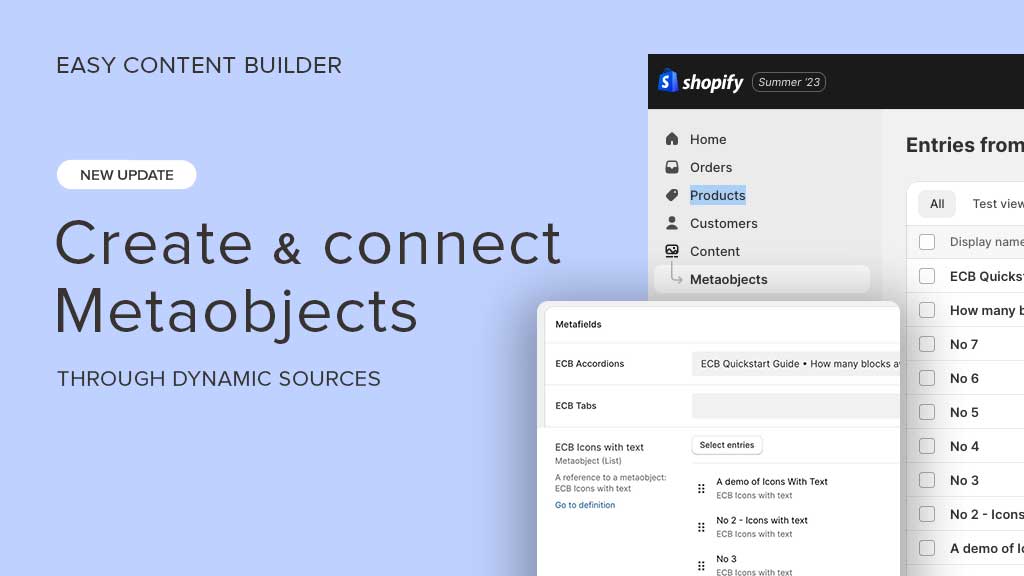Nov 30, 2023 Update: Easy Content Builder introduces a new feature that enables you to create new Shopify metaobject templates faster - a handy way to create fully custom pages such as Recipes, Ingredient Lists, Product manuals (pdf files), Author bio, etc., More details here.
Easy Content Builder now allows you to add custom data and content by using metaobjects as a dynamic source. Metaobjects help you define and create custom structured, reusable data to enrich your Shopify pages that standard features can't match - such as size charts, product FAQs, ingredient lists, collection banners, recipes, specifications, etc.
Currently, the Easy Content Builder app helps you create and connect metaobjects to your Shopify online store through dynamic sources for 3 types of content:
- Icons with text
- Tabs - coming soon
- Accordions - coming soon
Let’s explore how to use metaobjects with our Easy Content Builder app to enrich your Shopify pages. Read on to learn:
- What are metaobjects and metafields?
- The difference between metaobjects and metafields
- Common use cases of metaobjects
- How to use metaobjects as a dynamic source in the Easy Content Builder app
What are metaobjects and metafields?
You want to display extra information on your online store beyond Shopify’s default data structure? Shopify provides you with two ways to do just that:
- Custom fields (Metafields)
- Custom objects (Metaobjects)
Metafields are custom fields that let you save and display specialized information that isn't usually captured in your default Shopify - think product highlights, recommended products, care instructions, and more.
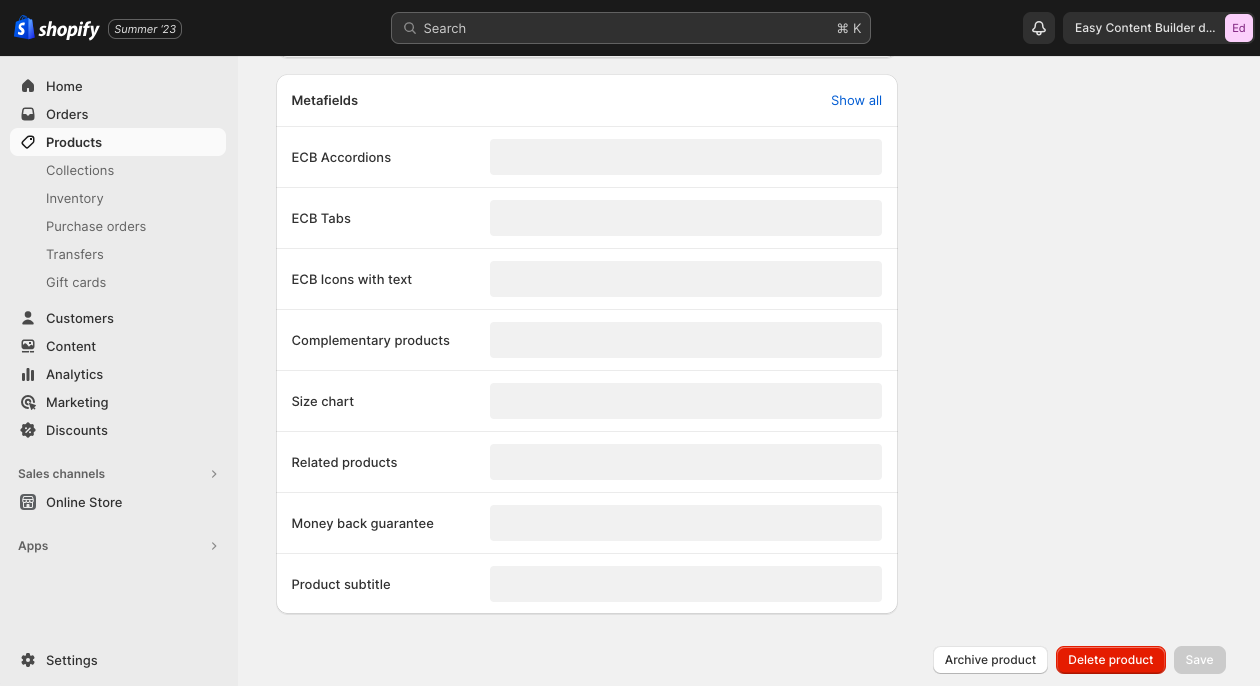
Shopify metafields
Metafields was first introduced during Shopify United 2021 as part of ‘Online Store 2.0’ big update and generally available for production in early 2022. You can create metafields straight in the Shopify admin and link to metafields from the theme editor with dynamic sources (before this release, you needed to edit the code manually or use an app to add this functionality).
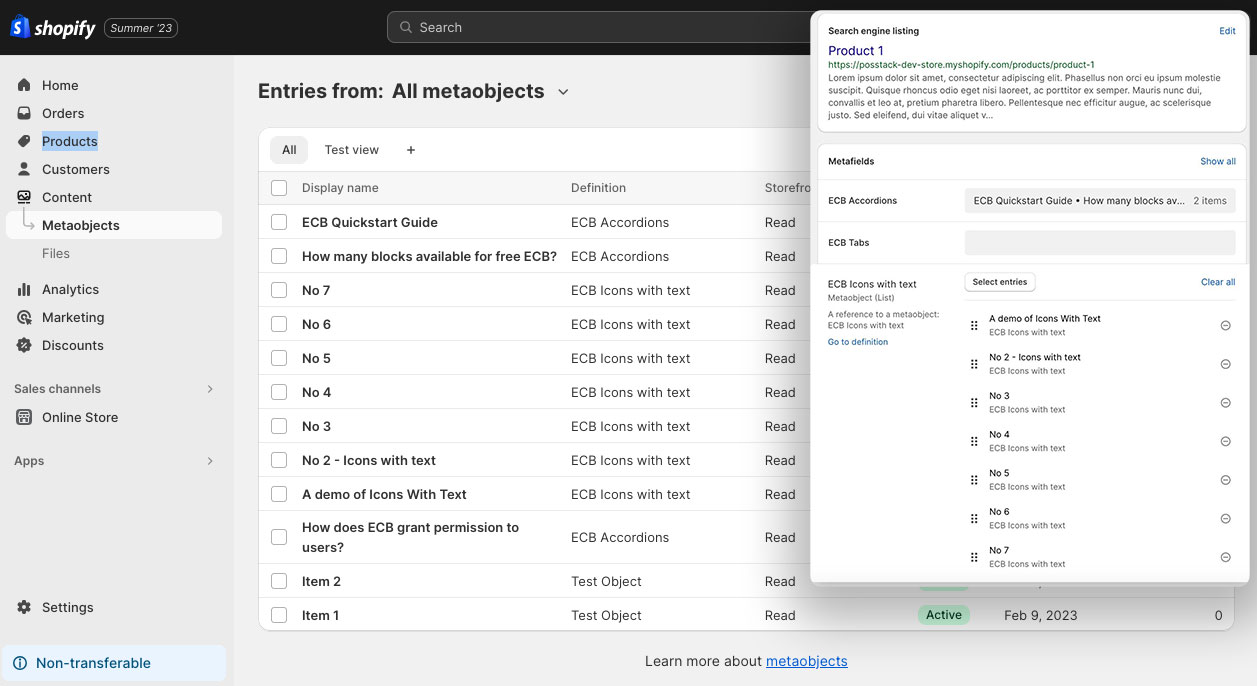
Shopify metaobjects
Metaobjects is Shopify's brand new addition to its custom data solution, launched with Shopify Edition (Feb 2023). Metaobjects are groupings of metafields - you can think of metaobjects as data containers. With metaobjects, you can create entirely new commerce objects like artist profiles, store events, and raw materials or extend Shopify with richer, multi-field content like product FAQs, size charts, product highlights, lookbooks.
The difference between metaobjects and metafields
The role of metaobjects and metafields is the same - allow adding extra information to parts of your store. So, what is the main difference between these options?
- Metafield: add our own custom fields to Shopify existing core objects such as products, customers, or blogs.
- Metaobjects: are a completely new model that allows you to create data objects yourselves. This entity can either be accessed on its own directly through Liquid or referenced on core elements within your store - like products, blogs, or collections.
Moreover, even though metafields let you add a custom piece of data to a specific part of your store, the downside is that you need to enter the value for each separately. For example, suppose you add Delivery dates and dimensions to 20 product pages using metafields. In that case, you need to edit each product one by one (even when using the bulk editor) to add value to the metafields.
In contrast, with Metaobjects, you create and update your custom data from one place, and the changes will be applied to all instances where the metaobjects are being used - rather than having to apply multiple metafields to each individual product.
Common use cases of metaobjects
Each Shopify store is different and might need custom data specific to their business. If you’re just getting started, below are some significant use cases to illustrate how you can unlock the metaobjects to personalize your store pages:
- Accordion FAQs: The same product FAQs (Frequently Asked Questions) can be referenced to products and can dynamically populate sections on the product detail page.
- Size charts: size chart popups represent data that are associated with product's dimensions - text, images, table data with an ability to switch between IN/CM values, etc.
- Ingredient library: displays a list of ingredients for your skincare line - with images and detailed information - on the product detail page.
- Recipes that can be attached to blogs and products.
- Collection banners.
- Quizzes
- (and more)
How to use metaobjects as a dynamic source in Easy Content Builder app
Without a doubt, metaobjects are a versatile tool for your Shopify site to store and display custom, structured information. That’s why we leverage this new custom data solution in our Easy Content Builder app.
Currently, Easy Content Builder has started supporting metaobjects for Icons with text first, Tabs and Accordion content types will follow soon.
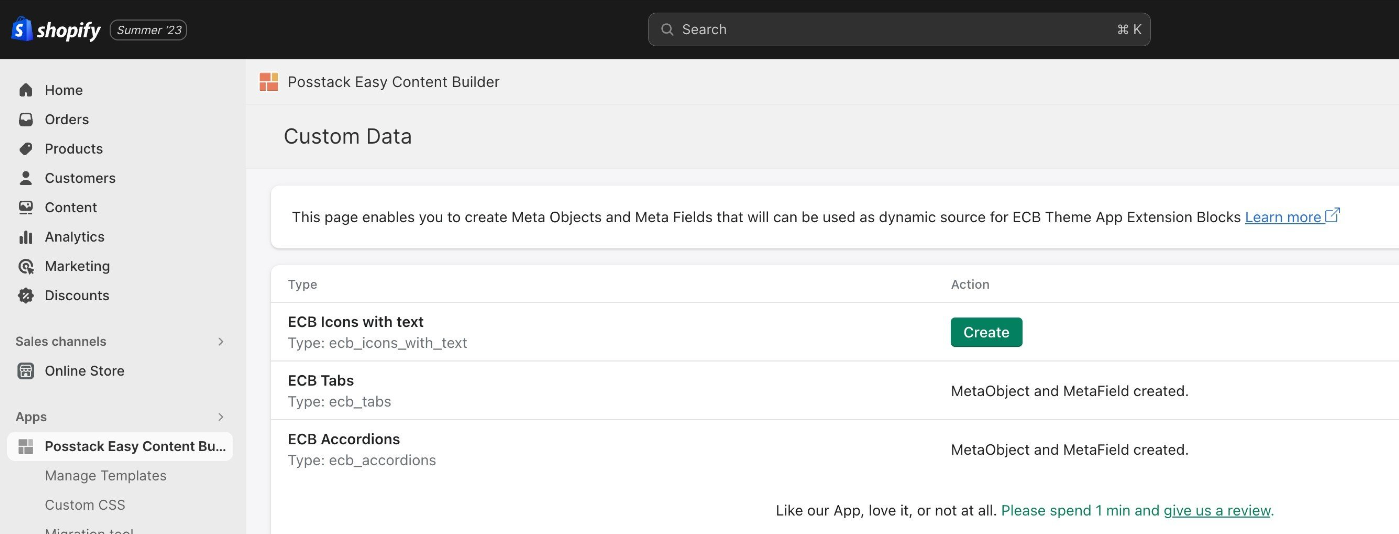
Metaobjects created by Easy Content Builder
Here is the simplified workflow when you work with the metaobjects in Easy Content Builder:
- Create Metaobjects
- Create entries for the Metaobjects
- Connecting metaobjects to your Online Store through dynamic sources
Once you add a metaobject mentioned above, the ECB app automatically creates metafield definitions that reference each metaobject respectively: Product, Page, Blog post.
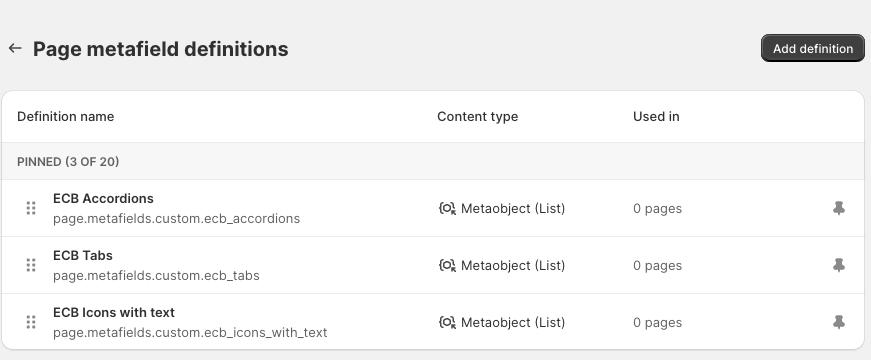
Easy Content Builder automatically creates the associated metafields.
If your store has a lot of content, then metaobjects are a new efficient way to store and display them. We will enhance this feature in the next release, so stay tuned.
Useful links:
- Using metaobjects to load SVG icons as a dynamic source
- Understand metaobjects
- Using metafields as dynamic source.
Conclusion
With metaobjects, the possibilities are endless - from providing richer product information and improving the appearance of your pages to creating your own data structures.
Easy Content Builder now helps you simplify your content management using metaobjects (you can expect more content types to be supported in our coming releases). As a result, you can conveniently generate and modify your rich content from one place without separately updating your store design or layout. It's time to embrace this new feature and see what you can create.
